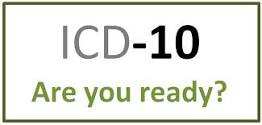Blogs
Time for Change: Preparing Your Practice for ICD-10
There have been many changes in healthcare over the past several years, and whatever your stance may be on them, we can all agree that periods of change present challenges, especially for private practices. One big, polarizing change involves the upgrade from the ICD-9 coding system to ICD-10. ICD-10 seeks to better catalogue the intricacies of modern healthcare, namely the highly specific conditions patients may have, and the treatments they receive for them. Among other benefits, it will ideally enhance interoperability between primary caregivers, specialists, hospitals, laboratories, and, of course, insurance companies.
But we all know it’s more than just a slightly updated name. Physicians have been utilizing ICD-9 since the 70’s for coding and billing purposes, and its successor purports to add some 125,000 new diagnosis and procedure codes, and a categorical restructuring of diseases. After nearly two years of delays and arguments, all hospitals and private practices are expected to have integrated ICD-10 by October, 2015. This has caused of much anxiety for both, but there are ways to prepare yourself, and your staff for the imminent changeover.
Getting an early start
ICD-10 brings with it a great deal of new information to crunch. The process may feel akin to learning a new language, so the sooner you and your staff begin learning the “flow” of it, the better. Now is the time to identify those among your team with certain organizational, or technological strengths to spearhead this effort. If you haven’t already, elect a content expert—this will likely be billing/coding supervisor—to not only learn the new system, but devise a streamlined method of implementation, including the training of other workers.
The importance of coders, and the right training
As mentioned in a previous post, and alluded to above, medical billing and coding specialists are highly valuable, and will be at the forefront for the ICD-10 change. It is possible for practices to acquire assistance from outside sources concerning the implementation of ICD-10 and other IT matters, but investing in your own workers may be the better choice. Certifying a billing specialist in coding is a long-term investment for your practice, and also proves your faith in your staff. Beyond computer skills, assess their knowledge in anatomy and physiology, as ICD-10 may require a greater amount than its predecessor, and make sure they have the resources to compensate.
The right hardware, and software
We have already discussed reasons for using reliable, up-to-date medical billing software, and the advent of ICD-10 may be the biggest reason of them all, as the transition will have the biggest impact on computer systems. Something else to consider is the hardware being used at your practice. Purchasing new computers and other hardware is costly, but it may be necessary. Try and glean some insight from your staff, likely the coders or IT specialist, on the capability and shelf-life of the equipment they use and maintain. Interoperability, the smooth sharing of universally coded information between key players in healthcare via a variety of mediums, is one bottom line of ICD-10. However, systems must be up to date across the board to facilitate that seamless exchange of information.
Testing ahead of time
You don’t want to end up testing ICD-10 with your partners for the first time at proverbial the eleventh hour, much less at half-past midnight. Large organizations like Medicare are likely ready for the conversion, but your practice could try a “test drive” with smaller organizations. This will be a good way to assess which claim types are, or may not be ready for the conversion.
Being active in the training process.
During the billing process, a greater level of documentation will be required than before, which may at first slow productivity. Diagnosis code sets will be incredibly specific, and coders will have to pay very close attention to the details, such as exact wound type. As a physician and the head of your practice, it will be wise in the coming months to take an “always learning” approach, which in this case could mean having a coder train you on increased documentation.
Gathering the right resources
This is one of those few times in life when it is OK to cheat. Delegate the task of creating your practice’s own ICD-10 “cheat sheet”, and make sure everyone has a copy. Keep extras in easy to access spots around the office. Certain companies like Cliniscient, and periodicals like BC Advantage actually offer similar guides, and resources of their own available for physicians, physical therapists, chiropractors, and more.
The time for dreading and putting off an inevitable change has passed. There will be difficulties and frustrations with ICD-10, but you can take heart in knowing that your practice is not alone in this, and that there are proactive ways to get a leg up before this October.
Brian Torchin
| HCRC Staffing | Brian@hcrcstaffing.com | www.hcrcstaffing.com
– See more at: http://3.228.224.47/blog/#sthash.regjTzUx.dpuf

